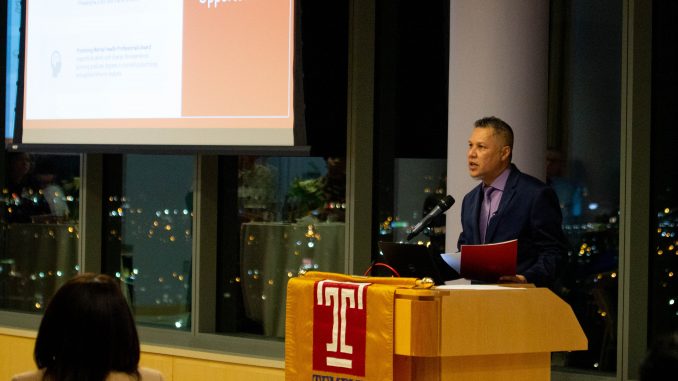
In 1884, Temple University established “Kindergarten Theory,” its first class for teachers from the School District of Philadelphia. Thirty-five years later, in 1919, the university formally established its Teachers College, which has since become Temple’s College of Education, according to the school’s website.
The College of Education celebrated its 100th academic year at its annual State of the College of Education Address on Thursday, Feb. 27, at Morgan Hall. The address was delivered by Gregory Anderson, the school’s dean. More than 100 faculty members, students and alumni attended.
The theme of this year’s event was “Here To Stay,” Anderson told The Temple News, meaning that “Temple isn’t going anywhere.”
“Our neighbors aren’t going anywhere, and the challenge before us, the opportunity before us, is how do we work in partnership with the surrounding communities to improve the life chances of students, children, families and to empower communities,” Anderson said.
During his speech, Anderson announced that the College of Education will change its name to the College of Education and Human Development. The college will also offer new scholarships for incoming students in the fall and will commit itself to a renovation of its home buildings, Ritter Hall and Ritter Annex, Anderson said during the speech.
“This year is particularly important because we’re celebrating the fact that we’re 100 years old,” Anderson said to The Temple News. “We wanted to ensure that our friends, our alumni, our students, have a sense of where we’re going in the next hundred years.”
The College of Education is allocating $4 million towards three new scholarships for Philadelphia students and one scholarship for students enrolled in the Temple Education Scholars Dual Enrollment Program who have been accepted into the university, Anderson said during the address.
Anderson told The Temple News that he is hoping to admit more scholars of color.
“The biggest challenge Pennsylvania has right now with respect to teacher preparation is actually bringing in, diversifying the educator workforce,” Anderson said. “So we just don’t have enough teacher-ed candidates of color despite being in a very diverse city, racially and ethnically. So this is going to be an opportunity to provide scholarships for people that are committed to all kinds of identities.”
The four new awards available to Philadelphia students are the “Community College of Philadelphia Award” for students transferring from the Community College of Philadelphia, the “Promising Mental Health Professionals Award” for students pursuing degrees in applied behavior analysis and counseling psychology who have “diverse life experiences,” the “Robert J. Smith Memorial Scholarship” for Temple Education Scholars who are enrolling in the College of Education and the “College of Education Impact Award” for those who graduated from public and charter schools, Anderson said during his speech at the event.
.
The College of Education hopes to have these scholarships available for approximately 20 students entering the school in the fall, Anderson told The Temple News in an interview.
Juliet Curci, the assistant dean for college access and persistence, said that recently released statistics from the Pennsylvania Department of Education reveal that 96% of teachers in Pennsylvania are white. Curci said that this “doesn’t match our student demographics.”
“Pennsylvania public school students, 30% are students of color and there are so many important benefits both to students of color K12 education but also to white students for having teachers of color,” Curci said. “Research has demonstrated that students of color who have a teacher of color just one year in their education have academic gains that are significant beyond those who never have a teacher of color in their academic years, K to 12.”
Kendra Childs, a 2019 early childhood education alumna who is getting her master’s in special education, said that the new scholarships can help place student teachers from Philadelphia back into the schools they went to.
“Having scholarships for students who are from the area, who know the area then also with their partnerships with Philadelphia schools like that would make so much more of an impact on them when they’re going out to like you know practicum or field experience,” Childs said. “Going back to these schools that they grew up in, I think it would make a better impact.”
The College of Education allocated $5 million for the renovation of Ritter Hall and Ritter Annex which will address the building’s code, provide disability accommodations compliant with the Americans with Disabilities Act and renovate faculty and staff offices, Anderson said. The renovation will begin this summer, he added.
Dozie Ibeh, Temple’s associate vice president for projects delivery, said at a board meeting in December that the goal of the renovation is to make the building more open and to allow more natural light into the building, The Temple News reported.
Kiley Billing, a junior secondary education and history double major, said that she is excited about the new renovation to Ritter Hall and Ritter Annex.
“In some of my classes we’ve discussed how the building’s not the most American with Disabilities Act accessible so making it inclusive for everybody is super important and very good,” Billing said.
Jill Swavely, a Teaching English to Speakers of Other Languages professor, said that the building needs renovation.
“From the conversations that have happened, it seems as though part of the focus is designing a new structure that will facilitate communication,” Swavely said.
The renovated building will help with communication among faculty and students, Swavely said.
“That’s the thing I’m looking forward to because the current structure doesn’t facilitate communication with colleagues or amongst students,” Swavely added. “We need some good student spaces.”
Updated at 4:37 p.m. on March 5.



Be the first to comment